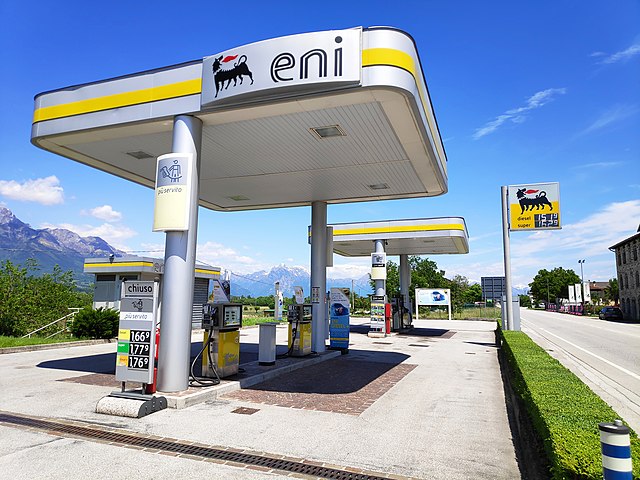Italy’s Supreme Court will decide on a landmark lawsuit brought by Greenpeace Italy and advocacy group ReCommon against oil and gas company Eni, according to the two groups.
Both nonprofits said on June 21 that their Supreme Court appeal was to expedite the trial, by showing that the Italian judiciary is the right jurisdiction to decide on climate lawsuit cases like this one.
“The climate crisis fueled by fossil fuel companies is here. We have seen it with soaring temperatures, we see it with extreme weather events.” Simona Abbate of Greenpeace Italy said in a press briefing. “We want immediate action to be taken, and that is why we went to the Supreme Court.”
Subscribe to our newsletter
Stay up to date with DeSmog news and alerts
The lawsuit, brought by the two groups in 2023, alleges Eni contributed to global warming and knew of the climate impacts of fossil fuel extraction since 1970. The case also includes two government entities — the Ministry of Economy and Finance (Mef), and the development bank Cassa Depositi e Prestiti (Cdp) — for the “influence they exercise on Eni,” the writ of summons stated. Between them, the ministry and the bank hold the Italian government’s one-third ownership stake in Eni.
The trial opened February 16 with its first hearing at the Court of Rome, where the judge agreed to set another hearing to rule on preliminary objections raised by Eni, Mef and Cdp, including a so-called “defect of jurisdiction.”
Matteo Ceruti, a lawyer for the plaintiffs, said that according to Eni, Cdp and Mef, a judge in Italy would not have the competence to decide on the greenhouse gas emissions of Eni group companies located outside Italy, or to decide on matters that would, in their view, relate to other spheres, such as politics or business.
In short, this means the lawsuit could be dismissed before substantial matters on the merits of the case are examined in depth.
The two environmental groups say that dismissing the lawsuit would set a dangerous precedent, potentially barring future climate litigation in Italian courts against both the government and private companies.
A dismissal would also stand in contrast to the recent ruling of the European Court of Human Rights in the case of the Klimaseniorinnen, in which the court upheld the right of people and associations to seek justice for Switzerland’s failure to address the climate crisis, according to the two groups.
“The appeal to the Supreme Court of Cassation stems from the need to protect at the highest judicial level our human rights endangered by the human-made climate emergency.” Greenpeace Italy and ReCommon stated in a press release. “We can no longer stall, we need to act now. That is why we have decided to turn to the Supreme Court to advance our demand for climate justice.”
On February 26, the Court of Rome ruled on the first climate lawsuit against the Italian state, which several Italian civil society organizations and individual citizens brought. The judge ruled that the case, known as “Giudizio Universale” and initiated by the nonprofit organization A Sud, was “inadmissible” because, simply put, the court cannot decide on climate matters that would relate to the political sphere. The Giudizio Universale legal team is currently working on appealing the judgment, Luca Saltalamacchia, an environmental rights lawyer representing the plaintiffs in the case and founder of the network Legalità per il Clima (Legality for Climate), told DeSmog. .
Suspension Request
The day before the two groups’ announcement, on June 21, Eni published a press release stating that Greenpeace and ReCommon requested a suspension of the climate change lawsuit and that such suspension follows their filing of a jurisdictional review of the Italian contest.
“Greenpeace and ReCommon’s request risks causing a lengthy suspension of the decision that otherwise would have been expected shortly,” Eni said in the statement. “Any delay would allow Greenpeace and ReCommon to continue their ongoing disinformation campaign, prioritizing media attention over rigorous research, analysis, and evaluation.”
Eni also stated that “despite the unfounded nature of the lawsuit, it has always provided the Court all the elements proving its proper conduct, and its transformation and decarbonization strategy.”
When contacted by DeSmog, an Eni spokesperson said the company had nothing more to add to the press release.
“The request we’re bringing forward, as Greenpeace and Re Common, potentially shortens the time frame because it jumps right at the end of the three levels of judgment,” Greenpeace Italy’s Abbate said during the briefing.
According to the plaintiffs’ lawyer, Ceruti, the suspension is prescribed by the Code of Civil Procedure whenever an appeal for a regulation of jurisdiction is filed before the Supreme Court in Italy.
“Unlike what Eni has said in the last few hours, we want this lawsuit to go forward, to get into the merits of the damage, which Eni’s climate-altering emissions are causing to the health and lives of citizens,” said Abbate. “Also, unlike what Eni has said, we do not want to stall, on the contrary … we want immediate action to be taken, and that is why we have appealed to the highest court in our country.”
Subscribe to our newsletter
Stay up to date with DeSmog news and alerts






